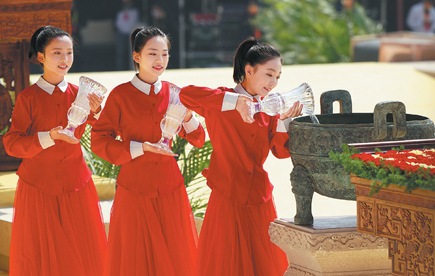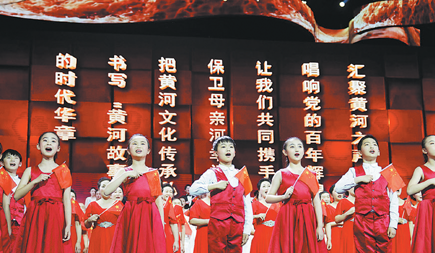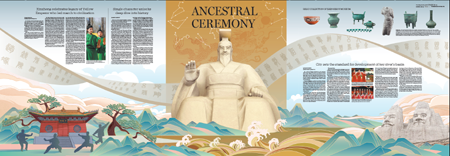
From left: A pottery bowl dates back to the Yangshao culture period of 5,000-7,000 years ago. A bronze vessel with an ox head design dates back to the Shang Dynasty (c.16th-11th century BC). A set of nine tripods and eight food containers made of bronze crafted during the Spring and Autumn period (770-476 BC) used as ritual objects. An anonymous stone sculpture of Bodhisattva from the Tang Dynasty (618-907). A bronze square pot with a beast motif dates back to the Shang Dynasty. A bronze pot with an animal motif and long neck dates back to the Han Dynasty (206 BC-AD 220).

Three young actors pour a pot of Yellow River water into a bronze tripod at the 2022 Xinzheng ceremony to worship the Yellow Emperor.

Children perform at the opening ceremony of the Yellow River Culture Month held in Zhengzhou, Henan province, in 2021.

As a cradle of Chinese civilization and a national central city along the Yellow River economic belt, Zhengzhou, capital of Henan province, has propelled the ecological protection and high-quality development of the Yellow River basin from multiple dimensions, including policies, industrial transformation, opening-up and integrated growth combining ecology, culture, tourism and urbanization.
To date, Zhengzhou has issued the Overall Development Plan for Building the Core Demonstration Zone of Ecological Protection and High-Quality Development in the Yellow River Basin (2020-35), the Construction Scheme for the Starting Area of the Core Demonstration Zone for Ecological Protection and High-Quality Development in the Yellow River Basin (2020-35), and other key initiatives on such sectors as culture, museums, tourism, flood control and water resources and transportation.
According to the overall plan, the core demonstration zone mainly covers the area along the Yellow River within the jurisdiction of Zhengzhou, extending from Langchenggang town in Zhongmou county in the east to Kangdian town in Gongyi county in the west, and from the Lianyungang-Khorgos Expressway in the south to the central line of the main river channel of the Yellow River in the north, with an area encompassing approximately 1,200 square kilometers.
Green priority
Based on its own characteristics, Zhengzhou has clearly defined building an ecological protection demonstration zone along the Yellow River, becoming a national growth gauge for high-quality development, and setting a bench mark for historical and cultural heritage of the Yellow River.
Specifically, it focuses on ecological protection and the tranquility of the Yellow River, efficient utilization of water resources, industrial transformation and innovation, cooperation, protection and inheritance of Yellow River culture, infrastructure interconnection, and people's livelihoods. Over 1,500 projects with a total investment of 1.1 trillion yuan ($152.78 billion) are planned. As of now, more than 230 projects have been implemented, with a total investment of nearly 100 billion yuan.
Zhengzhou has constructed ecological corridors along the Yellow River, enhanced the greening of Mangling town, restored wetlands and carried out comprehensive management of the ecological environment in the beach areas. As a result, the Zhengzhou section of the Yellow River embankment is becoming a green ecological barrier integrating natural scenery, Yellow River culture, leisure experiences and flood protection.
According to the city's government work report for 2023, the digital ecological protection monitoring platform for the Zhengzhou section along the Yellow River has been completed and put into use, and its water quality of the main stream of the Yellow River has stabilized to meet Class II surface water standards. Also, thanks to comprehensive efforts over the years, Zhengzhou has significantly improved the ecological environment within the Yellow River wetlands and protected the populations of flora and fauna. Statistics show the population of wild bird species in Zhengzhou has increased from 169 species at the establishment of the protected area in 2006 to the current 283 species.
Cultural roots
Zhengzhou has formulated three major plans highlighting cultural heritage, culture and tourism development and intangible culture heritage to further strengthen the protection, inheritance and promotion of the Yellow River culture. The city has launched 10 vital cultural tourism projects, including construction of the National Yellow River Museum, the Yellow River Cultural and Arts Complex, and the National Archaeological Site Park in Dahucun, serving as main historical and cultural landmarks of the Yellow River.
Integrating tourism resources such as Songshan Mountain culture, Shangdu culture, referring to the Shang Dynasty (c.16th-11th century BC) civilization centered around Zhengzhou, and root culture, namely the traditional Chinese philosophy of returning to one's roots and recognizing ancestors, the city has issued a series of high-quality tourism routes. They include the Origin of Chinese Civilization Tour, Tour of Cultural Celebrities' Learning and Practice, Exploration of Historical Relics Tour, Experience the Scenery of the Great River Tour, and Ecological Health and Leisure Tour. It has likewise integrated Yellow River cultural elements into the design of urban areas, constructing a high-quality leisure and ecological system featuring Yellow River culture, natural scenery and a slow pace of life.
Zhengzhou has also carried out projects of fine arts and literature under the theme of the Yellow River, producing outstanding works such as Eternal Love of the Yellow Emperor, Night Banquet in the Tang Palace, and Loyalty and Patriotism. Through various forms such as social science research, cultural performances and the inheritance of ICH, it tells the historical and contemporary stories of the Yellow River.
In addition, the city has built a platform for urban cultural tourism development in the Yellow River basin and formed a widely influential business model for Yellow River cultural tourism through events such as the 2023 first World Great Rivers Civilizations Forum and the Yellow River Culture Month.
wangjinhui@chinadaily.com.cn

